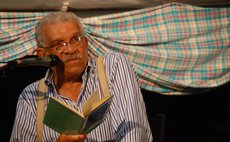Sermons in stones
These days, we marvel at the remarkable skill of athletes throughout the world—even by West Indians. The truth is that deep within all of us there is a certain power which often lies hidden and never comes to the surface until we are challenged to do so. The Olympic Games are nothing more than a proclamation of the power residing in human beings, a power which rightly used could lead us to solve all our problems and transform the world.
Strangely, the greatest Olympic story of all time is not a story of success, but a story of defeat; it is not a story of gain, but a story of loss. It is a story of the triumph of the spirit over petty rivalry and the craze for success. It speaks to us of the changes which we ought to make in our perception of the goal of human endeavour. A powerful message was given, and its rejection led to the destruction of a whole nation.
In 1936, Adolf Hitler, Chancellor of Germany, arranged to have the Olympic Games staged in Berlin as a world show of Aryan supremacy. From the other side of the world, was Jessie Owens, a Black American athlete. At the Long Jump, Jessie Owens' main opponent was the German athlete, Carl Ludwig Long.
Jessie Owens had his first two jumps disqualified and was staring defeat in the face. His German opponent approached him and explained to him what he should do to avoid being disqualified. Jessie Owens took his advice and eventually went on to break the World Record and win the Gold Medal. Carl Ludwig Long came second, and was the first to congratulate Jessie Owens. In fact, they walked arm in arm to the dressing room.
That was too much for Adolf Hitler. Proud man that he was, enraged, he stormed out of the stadium to express his wrath at defeat. Yes, Jessie Owens won the contest, but the true hero of the day was Carl Ludwig Long. In fact, posterity decided that his heroic action should never be forgotten. He died in 1943, during World War II, and was awarded a medal posthumously for his great spirit of sportsmanship.
Modern society is plagued with continuous expressions of hostility by most people towards their fellow-men. Ruthless competition is the order of the day, while everyone seeks to be on top. Incessant rivalry thwarts any attempt at harmonious relationship.
We need a drastic reordering of values. A special effort has to be made not to imitate the beasts of the jungle and seek to destroy one another. Most people are convinced that the only way to defeat an opponent is to attack his credibility, denigrate him, abuse him, paint the worst possible picture of him, crush him.
But there is another way. There is the way of courtesy, of gentleness, of magnanimity, of love. Sometimes all that we need to do is to be silent. We gain absolutely nothing by vile expressions of anger. Self-restraint is a remarkable gift.
When I performed my ministry in Antigua, a mother of a large family related to me this story. At that time, corporal punishment was an accepted practice in the home and at school. One day, she decided to beat one of her daughters. She was very angry, and she relentlessly rained heavy blows on the poor child. The young girl remained on the spot and never moved. She did not scream; she never uttered a word. The mother was defeated. She resolved never to beat her daughter again!
We need to face the truth about ourselves. Most of the time, our violent expression of anger is the result of a lack of self-confidence. We have very little inner strength. We need to practise self-discipline. We lack self-control. This is so in our homes, in our schools, in political life, in social life, in the world of business. The only way we know to affirm ourselves is to crush our opponent. We wrongly call this achievement or success. However, it is the person who practises self-control, the one who possess inner strength, the person who respects the other man, the person who is aware of the power of silence, who carries the day. He or she it is who is truly on top of the world!




